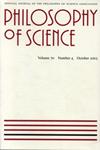美国哲学对相对论的接受
IF 1.4
2区 哲学
Q1 HISTORY & PHILOSOPHY OF SCIENCE
引用次数: 0
摘要
历史学家已经证明,关于相对论含义的哲学讨论在很大程度上影响了20世纪20年代欧洲科学哲学的发展。然而,人们对这一时期的美国辩论知之甚少。本文描绘了三份美国哲学期刊对爱因斯坦理论的最初反应,并将这些论文置于当地知识分子的视野中。我们认为,这些讨论(1)刺激了科学哲学的一个独特的美国分支的发展,(2)为逻辑经验主义者铺平了道路,他们在第二次世界大战前移民到美国。本文章由计算机程序翻译,如有差异,请以英文原文为准。
The Reception of Relativity in American Philosophy
Historians have shown that philosophical discussions about the implications of relativity significantly shaped the development of European philosophy of science in the 1920s. Yet little is known about American debates from this period. This paper maps the first responses to Einstein’s theory in three U.S. philosophy journals and situates these papers within the local intellectual landscape. We argue that these discussions (1) stimulated the development of a distinctly American branch of philosophy of science and (2) paved the way for the logical empiricists, who emigrated to the United States in the years before World War II.
求助全文
通过发布文献求助,成功后即可免费获取论文全文。
去求助
来源期刊

Philosophy of Science
管理科学-科学史与科学哲学
CiteScore
3.10
自引率
5.90%
发文量
128
审稿时长
6-12 weeks
期刊介绍:
Since its inception in 1934, Philosophy of Science, along with its sponsoring society, the Philosophy of Science Association, has been dedicated to the furthering of studies and free discussion from diverse standpoints in the philosophy of science. The journal contains essays, discussion articles, and book reviews.
 求助内容:
求助内容: 应助结果提醒方式:
应助结果提醒方式:


